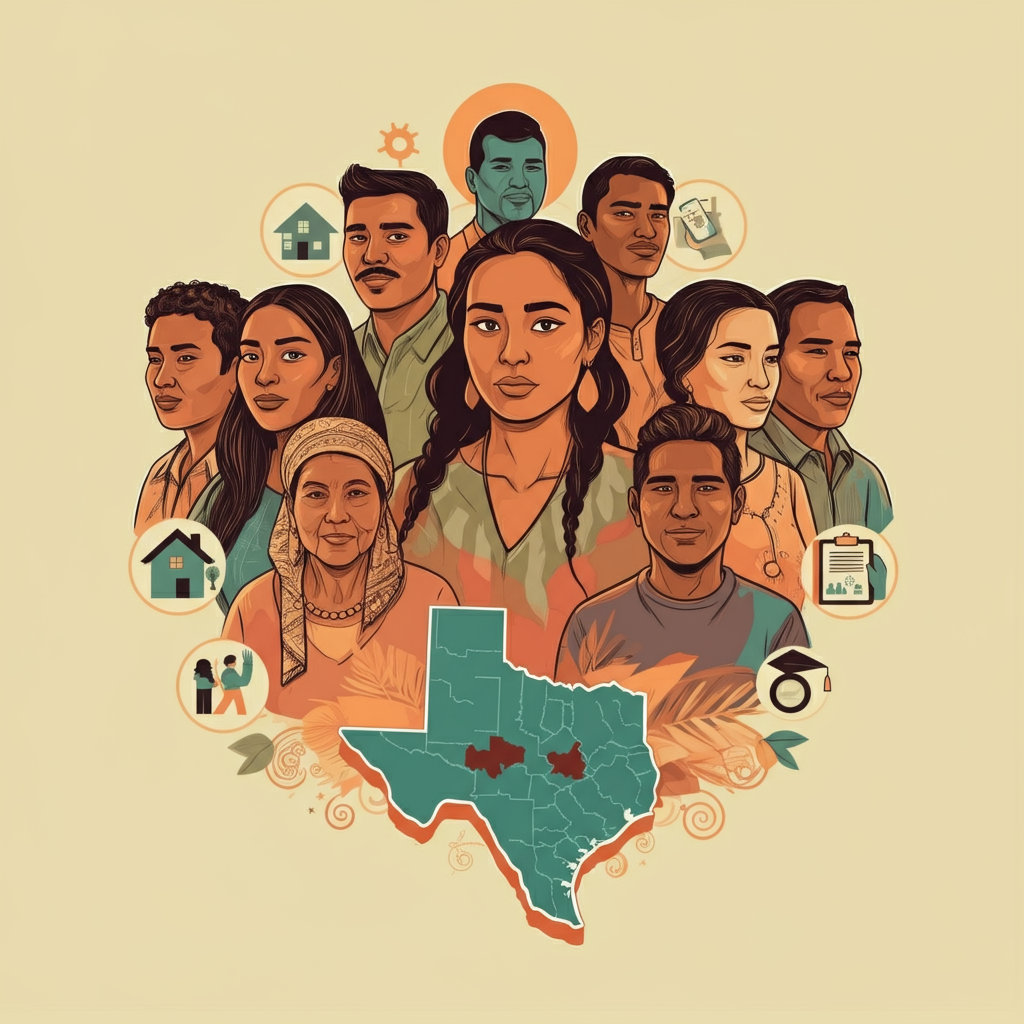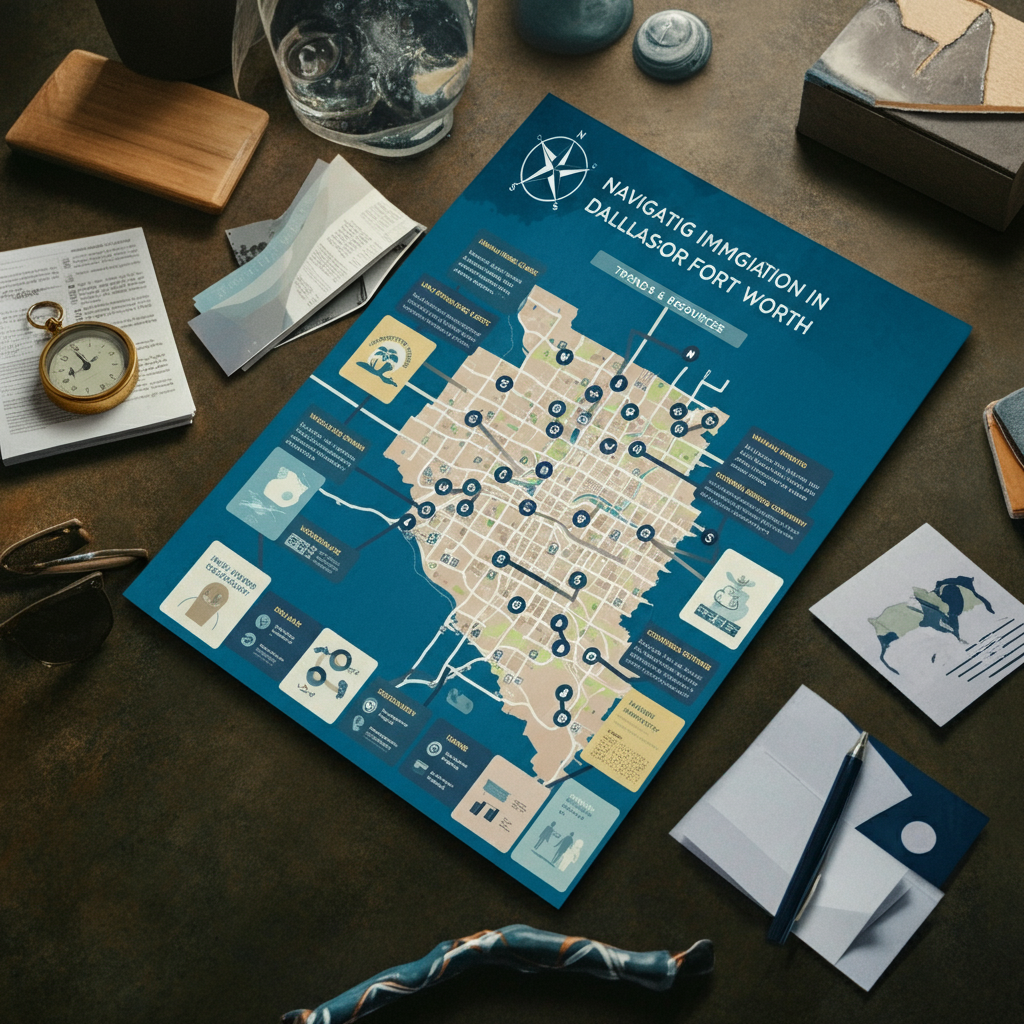Immigration policies, often debated on a national stage, have profound and direct consequences at the local level. For a rapidly expanding metroplex like Dallas-Fort Worth, these policies are not just abstract legal frameworks; they are powerful forces that shape our economy, define our workforce, and mold the very fabric of our communities. Understanding how immigration policy influences DFW is essential for charting a course toward a prosperous and inclusive future.
This article explores the deep connections between immigration policies and the trajectory of Dallas-Fort Worth. We will analyze how these rules affect economic growth, look at their impact on workforce development across key industries, and discuss potential scenarios for the region’s future based on different policy directions. By examining these dynamics, we can identify actionable steps for residents and leaders to take.
The Economic Engine: Immigration Policy and DFW’s Growth
The economic success story of Dallas-Fort Worth is inextricably linked to its ability to attract and integrate talent from around the world. Immigration policies act as the gatekeepers, either facilitating or hindering this flow of human capital.
Attracting High-Skilled Talent
DFW’s burgeoning tech sector, often called the “Silicon Prairie,” relies heavily on high-skilled immigrant workers to fill critical roles in engineering, software development, and information technology. Policies centered around H-1B visas, for example, directly impact the ability of local giants like Texas Instruments and smaller tech startups to recruit top international talent. When these visa programs are expanded and streamlined, DFW companies can compete globally, innovate faster, and create more jobs for everyone. Conversely, restrictive policies or processing backlogs can create a talent bottleneck, slowing growth and pushing companies to look for talent elsewhere.
Historically, periods of more open high-skilled immigration have coincided with significant economic booms in North Texas. The influx of engineers and IT professionals from countries like India and China in the late 1990s and 2000s helped establish the region as a major tech hub.
Fueling Entrepreneurship and Small Business
Immigrants are natural entrepreneurs, starting businesses at higher rates than the native-born population. Policies that provide clear pathways to legal residency and eventual citizenship encourage long-term investment. When an immigrant feels secure in their status, they are more likely to buy a home, start a business, and put down deep roots in the community.
Think of the countless immigrant-owned restaurants, retail shops, and professional service firms that line the streets of Plano, Irving, and Garland. These businesses do more than add cultural vibrancy; they create jobs and generate billions in local tax revenue. Policies that create uncertainty, such as the recent debates around DACA (Deferred Action for Childhood Arrivals), can have a chilling effect. Young entrepreneurs, or “Dreamers,” may hesitate to launch a new venture if their ability to remain in the country is in question.
The Workforce of Tomorrow: Policy’s Impact on Labor
Beyond high-skilled tech and entrepreneurship, immigration policies are critical for the stability of DFW’s entire labor market. From construction to healthcare, immigrants are essential to meeting workforce demands.
Essential Workers in Key Sectors
The construction boom that is reshaping the DFW skyline and building new suburban communities depends heavily on immigrant labor. Likewise, the region’s massive hospitality industry, which powers everything from international conferences to tourism, relies on a diverse, foreign-born workforce. Policies that affect the legal status of these workers can have immediate and disruptive consequences.
For instance, stricter enforcement policies without corresponding avenues for legal work authorization can drive labor underground. This not only makes workers more vulnerable to exploitation but also creates instability for employers. Companies face labor shortages, project delays, and increased costs. A balanced immigration policy that includes a viable guest worker program or other legal channels for essential workers could provide the stability that these core DFW industries need to thrive.
Filling Gaps in Healthcare
As the DFW population ages, the demand for healthcare services is skyrocketing. Immigrants are disproportionately represented among the region’s doctors, nurses, and especially home health aides and elder care providers. Many foreign-trained medical professionals face significant hurdles in getting their credentials recognized in the U.S. Policies designed to streamline this process could unlock a massive pool of talent, helping to alleviate staffing shortages in hospitals and clinics across Fort Worth and Dallas. Without these workers, wait times get longer, and the quality of care can suffer.
Future Scenarios for DFW: The Path Forward
The future of Dallas-Fort Worth will be significantly influenced by the immigration policies enacted today. Two potential scenarios illustrate the stakes.
Scenario 1: A Path of Restriction
If policies become more restrictive—severely limiting high-skilled visas, offering no pathway for undocumented workers, and increasing interior enforcement—DFW could face significant challenges. The tech sector might struggle to find talent, construction costs could rise due to labor shortages, and a climate of fear could harm community cohesion and trust in law enforcement. The economic dynamism that defines the region could slow as a vital source of labor and innovation is curtailed.
Scenario 2: A Path of Strategic Welcome
Conversely, if DFW and Texas advocate for comprehensive and sensible immigration reform, the future looks brighter. This approach would involve streamlining legal immigration pathways for both high-skilled and essential workers, providing a permanent solution for Dreamers, and investing in integration programs like English language classes and job training. In this scenario, DFW would solidify its status as a global competitor, businesses would have a stable and reliable workforce, and our communities would be enriched by the full participation of all residents.
Actionable Insights for a Thriving Community
Creating a welcoming and economically vibrant DFW is a shared responsibility. Both policymakers and residents have a role to play.
For Policymakers:
- Advocate for Federal Reform: Local and state leaders should actively lobby for comprehensive federal immigration reform that addresses the needs of the Texas economy. This includes modernizing visa systems and creating a pathway to legal status for the undocumented population.
- Invest in Integration: Fund local programs that help immigrants integrate successfully. This includes English language and civics education, workforce development, and support for foreign credential recognition.
- Foster Trust: Ensure local law enforcement focuses on community safety, not federal immigration enforcement, to build and maintain trust with immigrant populations.
For Residents:
- Stay Informed: Understand the facts about immigration’s impact on DFW, moving beyond national rhetoric to see the local reality.
- Support Immigrant Entrepreneurs: Make a conscious effort to frequent businesses owned by immigrants in your neighborhood.
- Engage in Civil Discourse: Talk to your neighbors and elected officials about the importance of creating a welcoming community for all.
The future of Dallas-Fort Worth is not predetermined. It will be built by the people who live here and shaped by the policies we choose to support. By embracing smart, humane immigration policies, we can ensure that North Texas remains a beacon of opportunity, growth, and inclusion for decades to come.






